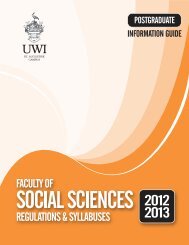Faculty of Humanities and Education (Postgraduate) - The University ...
Faculty of Humanities and Education (Postgraduate) - The University ...
Faculty of Humanities and Education (Postgraduate) - The University ...
You also want an ePaper? Increase the reach of your titles
YUMPU automatically turns print PDFs into web optimized ePapers that Google loves.
78<br />
POSTGRADUATE REGULATIONS & SYLLABUSES 2012 - 2013<br />
THE FACULTY OF HUMANITIES & EDUCATION<br />
H. Closure Skills<br />
(<strong>The</strong> art <strong>of</strong> giving the learner a sense <strong>of</strong> completeness<br />
<strong>of</strong> accomplishment by pulling together main facts <strong>and</strong><br />
ideas taught <strong>and</strong> providing a link between past <strong>and</strong> new<br />
knowledge)<br />
• Ability to reduce anxiety in learners by helping them<br />
to arrive at solutions<br />
• Ability to arrive at several minor closures in a step-bystep<br />
approach to learning<br />
• Ability to pull together threads <strong>of</strong> a complex manyfaceted<br />
lesson or series <strong>of</strong> lessons<br />
• Ability to summarize ideas presented by a variety <strong>of</strong><br />
means<br />
• Ability to design <strong>and</strong> set useful follow-up<br />
assignments<br />
3. Stage III - Post-Operational (See Stage I <strong>and</strong> II under B.<br />
Lesson Presentation Skills)<br />
assessment Competence<br />
Ability to:<br />
• devise formal <strong>and</strong> informal evaluative procedures to<br />
assess the effectiveness <strong>of</strong> instruction;<br />
• ensure that evaluative devices are objective;<br />
• ensure that evaluative devices are valid;<br />
• ensure that evaluative devices are reliable;<br />
• use assessment data effectively <strong>and</strong> appropriately.<br />
REFERENCES<br />
Eggen, P., & Kauchak, D. (2004). <strong>Education</strong>al psychology: Windows<br />
on classrooms (6th ed.). Upper Saddle Rivers, NJ: Prentice<br />
Hall.<br />
Cooper, J. N. (Ed.). (2003). Classroom teaching skills (7th ed.).<br />
Boston, MA: Houghton Mifflin.<br />
CURRICULUM PROCESS COURSES<br />
EDLA5240-EDAR 5310<br />
COURSE DESCRIPTION: Curriculum Process is critical to<br />
classroom practice. Through the examination <strong>of</strong> the theoretical<br />
issues relevant to curriculum process, teachers will derive an<br />
underst<strong>and</strong>ing <strong>of</strong> the theoretical underpinnings <strong>of</strong> teaching <strong>and</strong><br />
learning. This section <strong>of</strong> the programme, therefore, helps teachers<br />
to develop a greater awareness <strong>of</strong> the nature <strong>of</strong> their curriculum<br />
areas, while providing opportunities for mastering the relevant<br />
content. Teachers are also exposed to those methodologies<br />
that would provide effective <strong>and</strong> efficient instruction, as well as<br />
those that promote learning in the particular curriculum area.<br />
ASSESSMENT<br />
A Curriculum Study (5,000 words) – 100%<br />
SYLLABUS<br />
Curriculum Process includes the teaching <strong>of</strong> a specific curriculum<br />
area <strong>and</strong> the following modules: Use <strong>of</strong> Media in <strong>Education</strong>,<br />
assessment in <strong>Education</strong>, Classroom/School-Based Research,<br />
<strong>and</strong> Electives.<br />
A. Teaching In <strong>The</strong> Curriculum Area<br />
In these sessions, which are detailed for each curriculum<br />
area, teachers are introduced to basic curriculum theory<br />
aimed at providing them with tools to design, implement,<br />
<strong>and</strong> evaluate curriculum in the context <strong>of</strong> all the factors<br />
that impact on teaching <strong>and</strong> learning.<br />
With this background, they explore methodologies <strong>and</strong><br />
develop strategies, materials, <strong>and</strong> resources to inform <strong>and</strong><br />
support their instructional practice.<br />
B. Assessment in <strong>Education</strong><br />
This component <strong>of</strong> the Diploma programme is an integral<br />
part <strong>of</strong> Curriculum Process. It will be delivered primarily<br />
by curriculum tutors, within the context <strong>of</strong> their particular<br />
disciplines. It will provide learning experiences that focus on<br />
the assessment <strong>of</strong> students’ learning outcomes in specific<br />
curriculum areas. However, core issues that are common to<br />
all curriculum areas will be delivered in plenary sessions.<br />
OBJECTIVES<br />
Teachers will have an opportunity to:<br />
1. consider issues related to the assessment <strong>of</strong> learning<br />
<strong>and</strong> learner characteristics;<br />
2. develop competence in designing <strong>and</strong> selecting test<br />
items <strong>and</strong> constructing tests for the measurement <strong>of</strong><br />
learning;<br />
3. become familiar with a variety <strong>of</strong> alternative<br />
assessment strategies for assessing learning;<br />
4. become acquainted with basic statistical techniques<br />
for the analysis <strong>and</strong> interpretation <strong>of</strong> test scores;<br />
5. develop skills in the collection, analysis, <strong>and</strong><br />
interpretation <strong>of</strong> a variety <strong>of</strong> non-test data for the<br />
assessment <strong>of</strong> learning <strong>and</strong> learner characteristics.<br />
CONTENT<br />
• Traditional <strong>and</strong> alternative purposes <strong>of</strong> assessment <strong>of</strong><br />
learning <strong>and</strong> the problems <strong>of</strong> assessing the varieties <strong>of</strong><br />
learning outcomes <strong>and</strong> learner characteristics<br />
• Techniques <strong>of</strong> assessment<br />
i. development <strong>of</strong> test items <strong>of</strong> various types<br />
ii. test construction<br />
iii. performance <strong>and</strong> product assessment (group <strong>and</strong><br />
individual), the use <strong>of</strong> alternative data sources, e.g.,<br />
portfolios, student interviews, observations, attitude<br />
measures, etc.<br />
• Statistical <strong>and</strong> other techniques for analysis <strong>and</strong><br />
interpretation <strong>of</strong> data<br />
ASSESSMENT<br />
<strong>University</strong> attendance requirements must be met (at least 75%).<br />
In addition, students may be required to make presentations<br />
<strong>and</strong>/or submit projects in their curriculum portfolios.

















